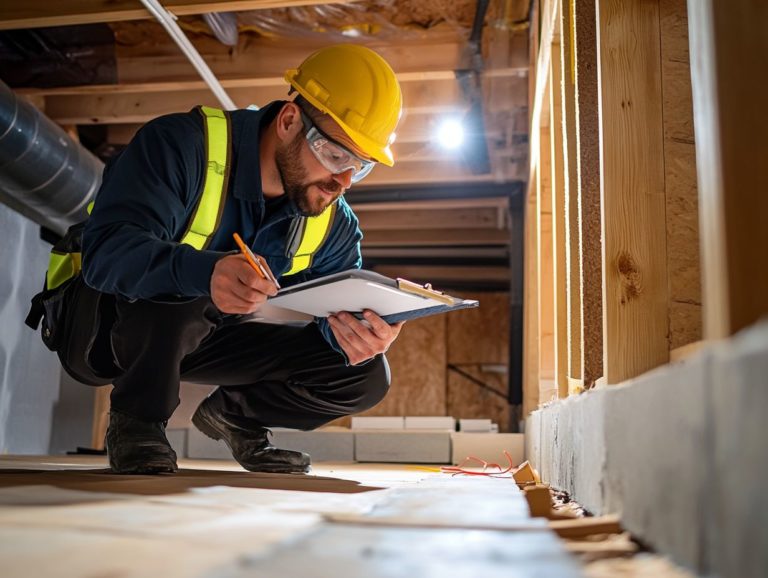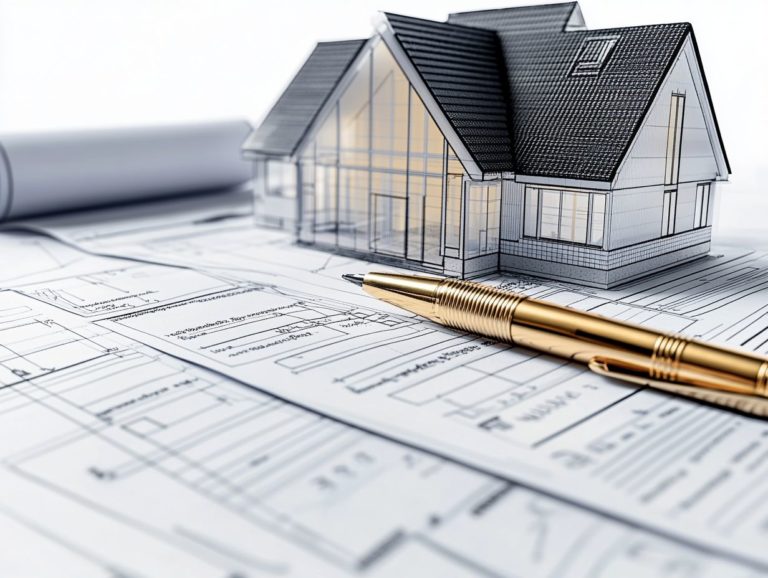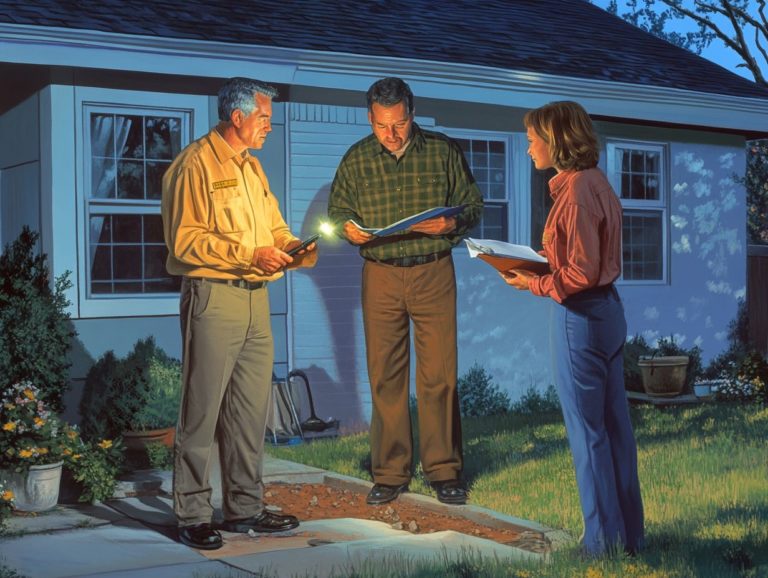5 Things to Know About Home Inspections
When you understand the importance of a home inspection, it becomes essential when buying or selling a home. This thorough process uncovers vital insights about a property’s condition, significantly influencing your decision-making.
Here, you ll find a detailed overview of what a home inspection involves, including its associated costs and potential red flags to watch out for. Whether you re a first-time buyer, an experienced seller, or simply seeking knowledge, you ll uncover valuable insights to navigate the world of home inspections with confidence.
Contents
- Key Takeaways:
- 1. What Is a Home Inspection and Why Does it Matter?
- 2. Why Is a Home Inspection Important?
- 3. What Does a Home Inspection Cover?
- 4. How Much Does a Home Inspection Cost?
- 5. How Long Does a Home Inspection Take?
- 6. Who Should Attend the Home Inspection?
- 7. What Happens If Issues Are Found During the Inspection?
- 8. Can a Home Inspection Be Waived?
- 9. How Often Should a Home Be Inspected?
- 10. What Are the Red Flags to Look for During a Home Inspection?
- 11. What Are the Benefits of Getting a Pre-Listing Inspection?
- 12. How Can a Home Inspection Affect the Buying or Selling Process?
- 13. What Are the Qualifications of a Home Inspector?
- 14. What Are the Different Types of Home Inspections?
- 15. How Can Homeowners Prepare for a Home Inspection?
- Frequently Asked Questions
- What is a home inspection and why is it important?
- Who typically conducts a home inspection?
- What should I expect during a home inspection?
- Do I need to be present during the home inspection?
- Will a home inspection guarantee that there are no issues with the property?
- Can I negotiate repairs based on the home inspection?
Key Takeaways:

A home inspection is a thorough assessment of a property’s condition, including its structure, systems, and components.
It is crucial to get a home inspection before buying or selling a home to identify any potential issues and get the most out of your home inspection to negotiate repairs or adjustments.
A home inspection typically covers the roof, foundation, plumbing, electrical, HVAC (Heating, Ventilation, and Air Conditioning), and more, but it’s important to clarify with the inspector what is and isn’t included.
1. What Is a Home Inspection and Why Does it Matter?
A home inspection serves as a thorough evaluation of a property’s physical structure, carried out by a qualified home inspector. This process equips you with essential insights into the structural health and safety features of the property you’re considering for purchase.
Included in this evaluation is a detailed inspection report that covers various aspects of the home everything from the foundation and roofing to electrical systems, plumbing issues, and the overall condition. This information is crucial for making informed decisions in the real estate process.
This approach reveals existing issues and gives you the power to anticipate future repairs. It allows for more effective budgeting. The inspector’s findings can significantly impact negotiations, as they may reveal potential problems that could affect the sale price or introduce additional contingencies.
You can leverage the inspection report to prioritize necessary upgrades. This ensures your future investment is not just a financial commitment but a safe and secure environment for your family. Understanding these critical elements fosters confidence and clarity, ultimately leading to greater satisfaction as a homeowner.
2. Why Is a Home Inspection Important?
A home inspection is absolutely essential for home buyers. It reveals potential issues and highlights the safety features of the property, helping you make informed investment decisions. For a successful process, consider these 5 tips for a smooth home inspection experience to protect you from unexpected repair costs that could surface after you’ve made the purchase.
By identifying red flags and hidden problems early on, you gain invaluable insights into the true condition of the home. This knowledge allows you to prioritize repairs and provides a strategic edge during negotiations with sellers.
You can confidently request necessary repairs or price reductions based on the inspection findings. Armed with a detailed inspection report, you can engage in fruitful discussions with mortgage lenders, demonstrating your due diligence and financial prudence.
This can ultimately lead to more favorable loan terms, putting you in a stronger position as you move forward in your home-buying journey.
3. What Does a Home Inspection Cover?
A comprehensive home inspection encompasses a wide array of elements essential for grasping the true condition of a property. Imagine a detailed checklist that meticulously evaluates structural components, electrical systems, plumbing issues, air conditioning, and pivotal foundation checks, along with understanding what to expect during a home inspection.
Beyond these primary areas, the checklist typically delves into roofing, insulation, windows, and doors. It offers insights into both the current state of the home and potential long-term maintenance needs.
Each of these components significantly influences the property’s overall valuation while also uncovering safety hazards that could jeopardize the occupants. For example, faulty wiring may pose fire risks, while plumbing leaks might signal serious water damage.
A thorough inspection, therefore, not only gives you the power to negotiate a fair price but also provides invaluable peace of mind for both buyers and sellers.
Ready to take the next step? Schedule your home inspection today!
4. How Much Does a Home Inspection Cost?
You can expect to pay between $300 and $500. This is a small investment that can save you from costly repairs later.
Factors like the property s age and unique features, such as pools or saunas, can change the overall cost. Understanding these elements is crucial.
Although an inspection may seem like an added expense, it often reveals hidden issues that could lead to significant financial burdens in the future.
By prioritizing a comprehensive inspection, you gain peace of mind and vital information that can influence negotiations. This ensures you make informed decisions in a competitive real estate market.
5. How Long Does a Home Inspection Take?
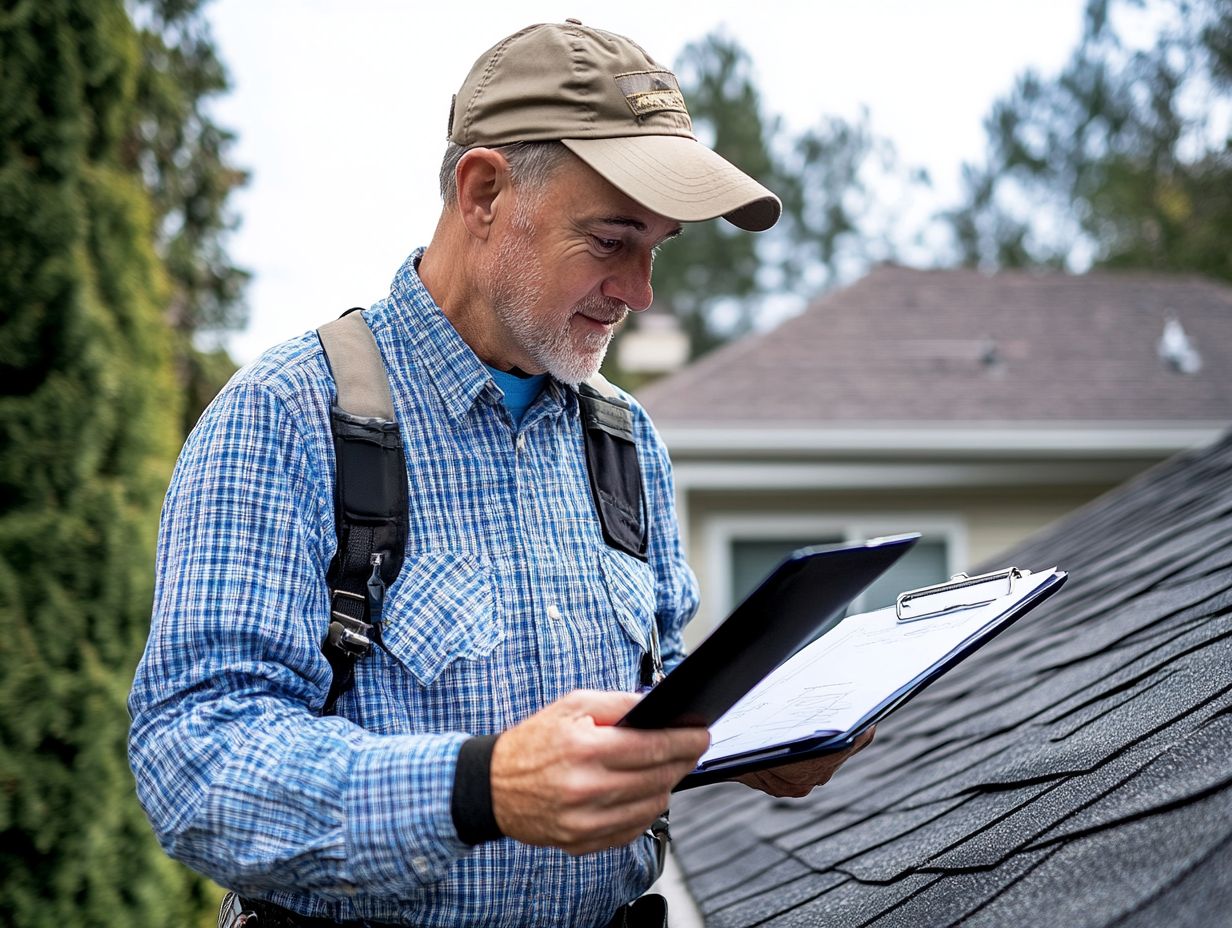
Home inspections usually take two to four hours. This depends on the size and complexity of the property.
Larger homes often take longer to inspect. They require examinations of multiple rooms and features, including the roof, plumbing, and electrical systems.
To truly grasp any potential issues, engage with the inspector throughout the process. This two-way communication helps you understand the significance of the findings and how they may impact your purchasing decision.
6. Who Should Attend the Home Inspection?
During a home inspection, it’s ideal for both you, as the home buyer or seller, to be present alongside the home inspector. This presence helps you talk about any issues that come up and allows for direct discussions regarding potential resolutions right on-site.
Being there enables you to hear firsthand observations and assessments, significantly reducing misunderstandings. The inspector highlights concerns while providing insights that empower you to make informed decisions.
By fostering this open exchange, you create a collaborative atmosphere that can lead to more transparent negotiations. This ultimately paves the way for smoother transactions and informed future actions regarding the property.
7. What Happens If Issues Are Found During the Inspection?
If your home inspection reveals issues, the report will highlight them. This equips you with vital information about repair costs and negotiations with the seller, ensuring necessary fixes are addressed before you finalize the sale. To better understand what to look for, check out the top 10 things to check during a home inspection.
This documentation acts as a negotiation tool and a roadmap for potential repairs that may require immediate attention. Understanding the severity of these issues can impact your purchasing decision significantly.
Act quickly to address these issues. A solid plan will empower you during negotiations, allowing you to approach the seller with clear expectations and specific repair requests. Being prepared can reduce anxiety and lead to a more favorable outcome in your home-buying journey.
8. Can a Home Inspection Be Waived?
You might consider waiving a home inspection in a competitive market, but tread carefully this choice comes with risks. Mortgage lenders often require a thorough evaluation of the property to ensure it meets safety and financial standards.
In a bidding war, skipping the inspection can make your offer more attractive to sellers, allowing for a quicker, smoother transaction. However, this strategy can backfire dramatically if hidden issues emerge after the purchase.
You could end up facing costly repairs or safety hazards that a proper inspection would have flagged. Additionally, forgoing the inspection can complicate negotiations.
While it may catch the seller’s eye initially, it might also raise concerns for lenders, who look for an appraised value that matches the property’s condition.
So, while waiving the inspection might grant you a competitive edge, you must carefully weigh the potential long-term consequences.
9. How Often Should a Home Be Inspected?
Homeowners are generally advised to schedule a professional home inspection every three to five years. It’s also wise to do so when renewing a home warranty to assess the ongoing structural health and condition of their property.
Regular inspections are crucial for keeping your home safe and attractive. These evaluations are invaluable for identifying minor issues, like leaks or wear and tear, before they spiral into significant problems that could lead to costly repairs.
By proactively addressing these potential concerns, you safeguard your investment, ensuring both longevity and comfort in your living spaces.
A well-maintained home can greatly enhance its marketability should you decide to sell in the future. Additionally, regular inspections provide peace of mind, allowing you to rest easy knowing that your property is in good condition and that the risks of unforeseen emergencies are kept to a minimum.
10. What Are the Red Flags to Look for During a Home Inspection?
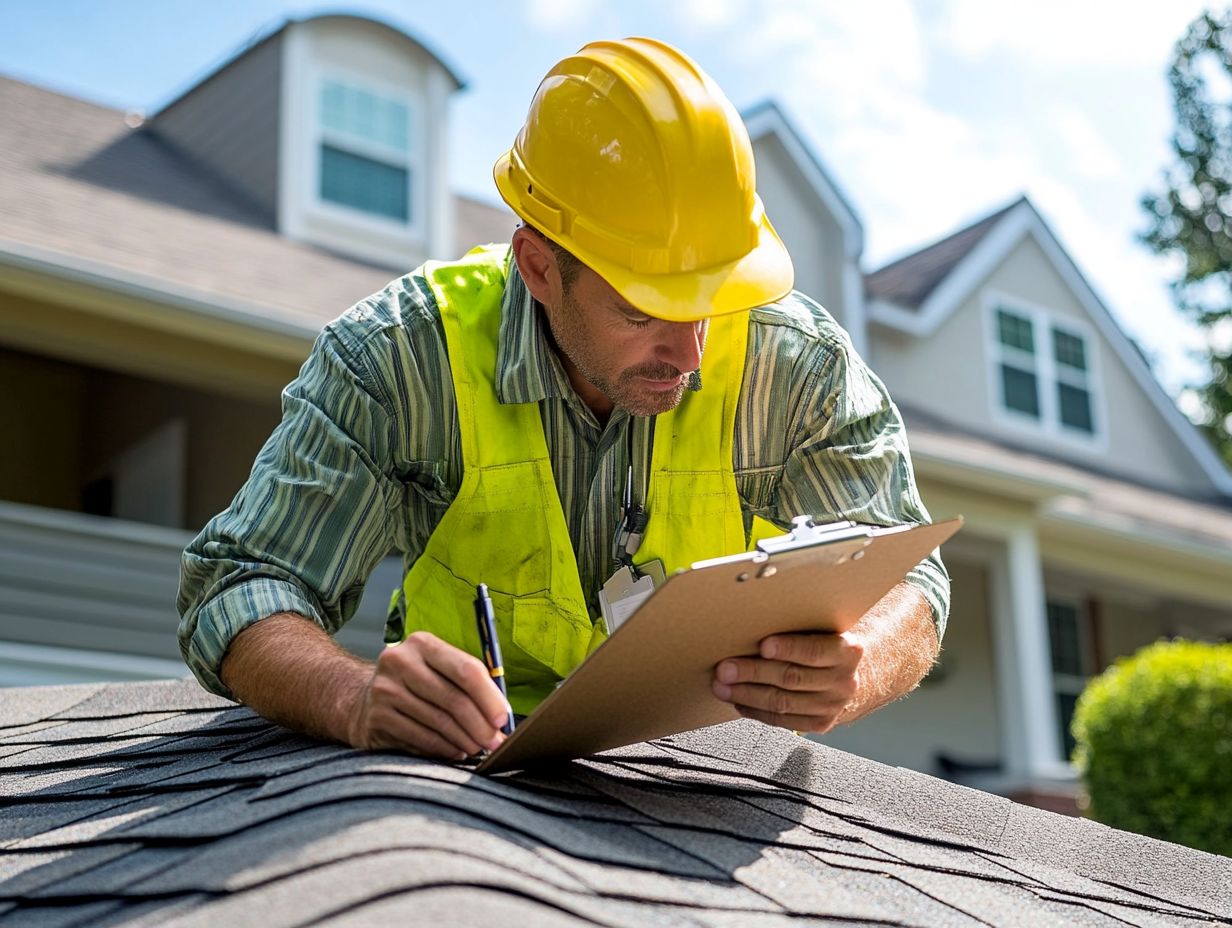
During a home inspection, you may encounter several red flags that signal potential issues. Look out for water damage, knob-and-tube wiring, and inadequate safety features; these should raise alarms and prompt further investigation. For a comprehensive understanding of what to look for, check out what to know about home inspection policies to avoid costly repairs later on.
Knob-and-tube wiring is an older type of electrical system that may not meet modern safety standards. Beyond these initial concerns, keep an eye out for signs of structural instability.
Cracks in the walls or uneven floors can hint at serious foundation problems that threaten the integrity of the entire property. Outdated heating and cooling systems can also lead to inefficient energy use, inflating your monthly bills and possibly requiring immediate replacement.
Don t ignore pest infestations, especially termites; they can cause significant damage to your home s structure, leading to hefty repair costs down the road. These issues not only present safety risks but can also dramatically lower the property s resale value.
Staying vigilant throughout the inspection process is crucial for making a smart investment.
11. What Are the Benefits of Getting a Pre-Listing Inspection?
A pre-listing home inspection empowers you as a seller! It allows you to proactively address potential issues, enhancing your property s appeal and possibly lowering repair costs before you hit the market.
By taking this thoughtful approach, you gain valuable insights into your home’s current condition, empowering you to make informed decisions regarding necessary repairs or improvements.
This not only helps you sidestep unpleasant surprises during the buying process but also fosters an atmosphere of transparency that instills confidence in prospective buyers.
When you tackle minor repairs before listing, you set the stage for a quicker sale at a better price, presenting your property in its optimal condition.
Ultimately, you ll find that investing your time and resources upfront reduces disruptions during negotiations and maximizes your return on investment.
12. How Can a Home Inspection Affect the Buying or Selling Process?
A home inspection can greatly influence your buying and selling journey. Understanding what to expect with a home inspection shapes negotiation strategies, alters repair requests, and impacts your financing options based on the inspection report findings.
The details in that report empower you to ask for lower prices or credits, making it a crucial component of your negotiations. If you re selling, you might feel inclined to make repairs or offer concessions to preserve the sale s value or speed up the closing process.
As leverage shifts during discussions, you can assert your needs with confidence as a buyer. Sellers, on the other hand, navigate these new dynamics, often adjusting their initial terms.
Inspection findings can ripple through financing channels, influencing how lenders perceive the property s overall worth and condition.
13. What Are the Qualifications of a Home Inspector?
A qualified home inspector typically holds certifications from reputable organizations like ASHI. They bring extensive knowledge and conduct thorough evaluations to provide accurate assessments of homes.
These certifications require a blend of formal training and hands-on experience, significantly enhancing the inspector s expertise. Inspectors are well-versed in critical areas such as plumbing, electrical systems, and the strength and stability of a building, enabling them to perform comprehensive evaluations.
This depth of qualification bolsters their credibility and instills confidence in clients. It makes the inspection process both reliable and thorough.
By adhering to stringent guidelines and pursuing continuous education, professional inspectors can spot potential issues that might affect property value, ultimately safeguarding your investment.
14. What Are the Different Types of Home Inspections?
Explore various home inspection options that suit your needs beyond the standard assessment. Consider specialized evaluations tailored to your specific concerns, such as:
- HVAC (heating, ventilation, and air conditioning) system checks
- Radon testing
- Lead paint inspections
- Assessments for water damage
These inspections play a crucial role in understanding potential hazards or maintenance issues within a property.
For instance, HVAC inspections ensure that your heating and cooling systems operate efficiently, particularly in older homes. Radon testing is also important, as it helps you gauge the risk of exposure to this harmful gas, especially in regions known for elevated radon levels.
If you have young children, lead paint inspections can provide invaluable peace of mind, given the severe health risks associated with lead exposure.
By opting for these specialized inspections, you can uncover issues that might remain hidden during a routine evaluation, giving you the power to make more informed and confident purchasing decisions.
15. How Can Homeowners Prepare for a Home Inspection?
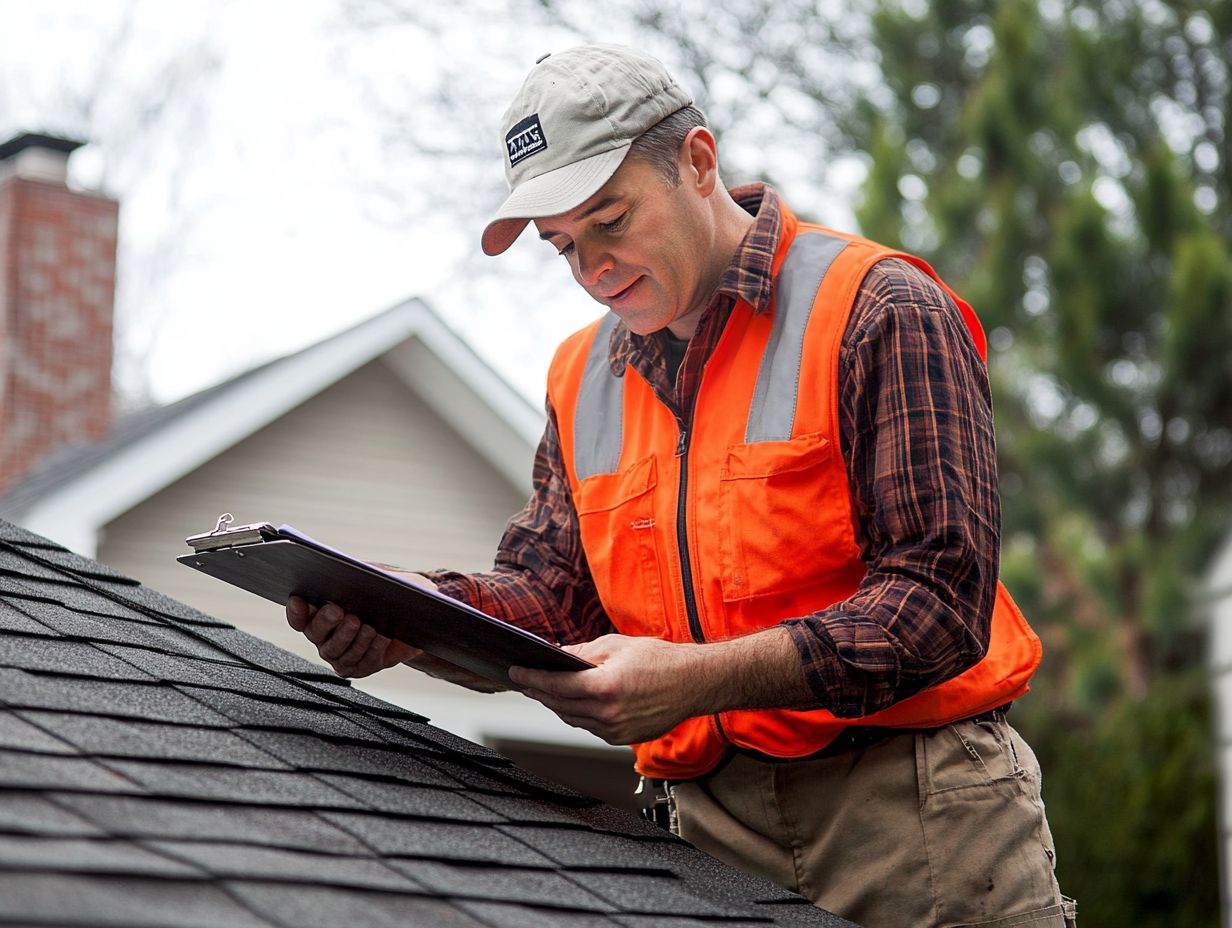
To effectively prepare for a home inspection, ensure your property is accessible and free of clutter. Review the inspection checklist and address any visible safety features or repairs that might influence the inspector’s evaluation.
Don t delay! Start decluttering your home today to ensure a smooth inspection. Tackling minor repairs, like fixing leaky faucets, patching up drywall, or replacing burned-out light bulbs, can significantly impact the assessment.
Consider being present during the inspection to provide context for any questions the inspector may have. This clarifies the property’s condition and history, fostering transparency for a smoother inspection overall.
Frequently Asked Questions
What is a home inspection and why is it important?
A home inspection is a visual examination of a property’s overall condition, including the structure, systems, and appliances. Understanding the basics of home inspections is important because it can reveal potential problems that may not be obvious to the untrained eye, helping you make an informed decision about purchasing a home.
Remember, a thorough home inspection can save you from costly surprises. Schedule yours today!
Who typically conducts a home inspection?
A home inspection is done by a professional home inspector. They are trained and certified to check the condition of a property.
Inspectors have the skills to identify potential issues, offering an unbiased evaluation of the home. Staying informed about home inspection trends can also enhance your understanding of what to expect during the process.
What should I expect during a home inspection?
Expect a thorough examination of both the interior and exterior of the property. This includes the roof, foundation, plumbing, electrical systems, and heating and cooling systems.
The inspector will also check for safety hazards. You will receive a detailed report on their findings.
Do I need to be present during the home inspection?
It’s a good idea to be present during the inspection. This allows you to ask questions and understand the property’s condition better.
If you can t attend, don t worry. The inspector will still provide a detailed report.
Will a home inspection guarantee that there are no issues with the property?
No, a home inspection doesn t guarantee that there are no issues. It s an evaluation of the current condition and cannot predict future problems.
However, it gives you crucial insights that empower your decisions about the purchase.
Can I negotiate repairs based on the home inspection?
Yes, you can negotiate repairs or a price reduction based on the inspection report. If significant issues are found, request repairs or negotiate a lower price to cover necessary fixes.


